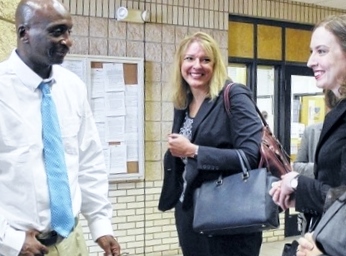 Edward McInnis with Sharon Stellato, Associate Director of the North Carolina Innocence Inquiry Commission, and investigator, Sarah Riney (Photo Mary Katherine Murphy The Laurinburg Exchange) In the early morning hours of February 23, 1988, an intruder broke into the home of an 81-year-old woman in Laurinburg, North Carolina. The attacker raped and robbed the woman and fled.
The woman, who was stabbed in the left shoulder with a letter opener and also suffered abrasions on her face, could only give police a very general description because the only light came from a penlight carried by the attacker. The woman said that after he forced her into the bedroom, the attacker covered her face with a comforter.
About a week later, Laurinburg police detectives questioned 27-year-old Edward McInnis after an informant allegedly said that McInnis had admitted raping the woman. McInnis denied involvement in the attack and provided an alibi which members of his family confirmed.
However, after being questioned two more times, McInnis, whose reading level was about that of a fourth grader, confessed to the attack. His version and that of the victim’s varied considerably.
McInnis said he raped the woman by the front door and the woman said she was raped in her bedroom. McInnis said he took $80 from the woman’s pocketbook—the victim said $5 was missing. McInnis was vague about how he entered and left the apartment, while the victim said the attacker came in the front door and exited the back door.
McInnis also was unable to describe the attack, saying only that he raped her. The victim said she was raped anally twice and that the attacker attempted to rape her vaginally.
On September 25, 1988, McInnis pled guilty in Scotland County Superior Court to charges of first-degree rape, first-degree burglary and armed robbery. Facing a maximum prison term of life plus 40 years, McInnis was sentenced to life plus 20 years.
Between 2004 and 2014, the North Carolina Center on Actual Innocence investigated McInnis' claim of innocence several times. Numerous requests were made for access to physical evidence collected during the original investigation, but police and the prosecution said that all the evidence had been destroyed. In 2014, the Center encouraged McInnis to apply to the North Carolina Innocence Inquiry Commission (NCIIC) so an independent search for evidence in his case could be conducted. The Laurinburg Police Department initially told the NCIIC that the physical evidence, which included rectal swabs from the victim, could not be found. But in March 2015, a new search for the physical evidence resulted in the discovery of the swabs in an evidence storage facility at the Laurinburg Police Department.
On August 5, 2015, the results of DNA testing performed on the swabs by Cellmark Forensics were passed to the office of Scotland County District Attorney Kristy Newton. The testing excluded McInnis as the source of biological evidence found on the swabs and generated the DNA profile of an unidentified male.
Five days later, on August 10, 2015, Newton asked that McInnis’s convictions be vacated. Superior Court Judge Tanya Wallace vacated the convictions and granted Newton’s motion to dismiss the charges. McInnis then was released from prison.
The results of the re-investigation of the case, during which alternate suspects were identified, were turned over to the Laurinburg Police Department and the District Attorney’s office. Cellmark performed Y-STR DNA testing on the evidence in the case. Because that form of DNA testing is incompatible with the FBI’s national DNA database, the profile cannot be uploaded to determine whether it matches the profile of either a convicted offender or DNA from another unsolved crime.
“Now that we have succeeded in exonerating an innocent man, we will reopen the case and set about trying to determine who is actually responsible for the crime,” Newton said.
In May 2016, Gov. Pat McCrory issued a pardon based on actual innocence to McInnis. As a result, McInnis was awarded $750,000 in state compensation. He also filed a federal civil rights lawsuit in December 2016. The lawsuit was settled in October 2018 for $4,250,000.
– Maurice Possley
|